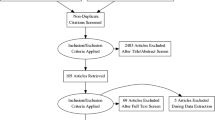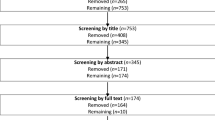Abstract
Objectives
An innovative curriculum was developed to equip public health students with appropriate attitude and skills to address healthcare of asylum seekers.
Methods
Implemented in 2005 the curriculum included: (1) didactic sessions covering epidemiology and health sequelae of torture, asylum laws, and approaches to identify survivors’ healthcare needs; (2) panel discussions with survivors and advocates; and (3) participating in medico-legal process of asylum seeking. Complementary mixed methods evaluations included pre- and post-curriculum questionnaires, formal curriculum evaluations, final papers and oral presentations.
Results
125 students participated. Students showed improved knowledge regrading sequelae of abuse and survivors’ healthcare needs (P < 0.01), improved attitudes towards working with survivors (P < 0.05) and self-efficacy in identifying at-risk populations and addressing healthcare of survivors (P < 0.05). Students reported increased desire to pursue global health and human rights careers.
Conclusions
As an advocacy and cultural competency training in public health practice addressing healthcare of refugees domestically, this curriculum was well received and effective, and will also help students better serve other similar populations. Population case-based domestic opportunities to teach global health and health and human rights should be effectively utilized to develop a well-equipped global health corps.
Similar content being viewed by others
References
American College of Physicians (1995) The role of the physician and the medical profession in the prevention of international torture and in the treatment of its survivors. Ann Intern Med 122(8):607–613
Amnesty International (2012) Amnesty International Report. http://files.amnesty.org/air12/fnf_air_2012_en.pdf. Accessed 16 Aug 2014
Asgary R (2013a) A call to teach medical students clinical human rights. Acad Med 88(3):298–299
Asgary R (2013b) Bringing global health and global health education home. Acad Med 88(7):908
Asgary R, Segar N (2011) Barriers to health care access among refugee asylum seekers. J Health Care Poor Underserved 22(2):506–522
Asgary RG, Metalios EE, Smith CL, Paccione GA (2006) Evaluating asylum seekers/torture survivors in urban primary care: a collaborative approach at the Bronx Human Rights Clinic. Health Hum Rights 9(2):164–179
Asgary R, Charpentier B, Burnett DC (2013a) Socio-medical challenges of asylum seekers prior and after coming to the US. J Immigr Minor Health 15(5):961–968
Asgary R, Saenger P, Jophlin L, Burnett D (2013b) Domestic global health: a curriculum teaching medical students to evaluate refugee asylum seekers and torture survivors. Teach Learn Med 25(4):348–357
Ashcroft RE (2005) Standing up for the medical rights of asylum seekers. J Med Ethics 31(3):125–126
Association of Schools of Public Health (2014) Competencies, learning outcomes, and critical educational elements. http://www.asph.org/document.cfm?page=1083. Accessed 14 Nov 2014
Association of Schools of Public Health Education Committee (2006) Master’s degree in public health core competency model, version 2.3. ASPH, Washington
Basoglu M (1993) Prevention of torture and care of survivors. an integrated approach. JAMA 270(5):606–611
Bertoncello C, Buja A, Silenzi A, Specchia ML, Franchino G, Lazzari A, Baldo V, Ricciardi W, Damiani G (2015) Good governance competencies in public health to train public health physicians. Int J Public Health. 60(6):737–749
Bischoff A, Bovier PA, Rrustemi I, Gariazzo F, Eytan A, Loutan L (2003) Language barriers between nurses and asylum seekers: their impact on symptom reporting and referral. Soc Sci Med 57(3):503–512
Carinci AJ, Mehta P, Christo PJ (2010) Chronic pain in torture victims. Curr Pain Headache Rep 14(2):73–79
Drain PK, Primack A, Hunt D, Fawzi WW, Holmes KK, Gardner P (2007) Global health in medical education: a call for more training and opportunities. Acad Med 82:226–230
Emory KW, Evans D, Stephenson R, Del Rio C, Curran JW (2014) Incorporating global health competencies into the public health curriculum. Public Health Rep 129(2):203–208
Farmer P (2005) Pathologies of power: health, human rights, and the new war on the poor. University of California Press, London
François G, Hambach R, van Sprundel M, Devillé W, Van Hal G (2008) Inspecting asylum seekers upon entry—a medico-ethical complex. Eur J Public Health 18(6):552–553
Gebbie K, Rosenstock L, Hernandez LM (eds) (2003) Who will keep the public healthy? Educating public health professionals for the 21st century. National Academies Press, Washington
Godkin M, Savageau J (2003) The effect of medical students’ international experiences on attitudes toward serving underserved multicultural populations. Fam Med 35(4):273–278
Heisler M, Moreno A, DeMonner S, Keller A, Iacopino V (2003) Assessment of torture and ill treatment of detainees in Mexico: attitudes and experiences of forensic physicians. JAMA 289(16):2135–2143
Istanbul Protocol (2004) UN Office of High Commissioner for Human Rights, Manual on Effective Investigation and Documentation of Torture and Other Cruel, Inhuman or Degrading Treatment or Punishment (IP). http://www.ohchr.org/documents/publications/training8rev1en.pdf. Accessed 11 Feb 2014
McNeill PM (2003) Public health ethics: asylum seekers and the case for political action. Bioethics 17(5–6):487–502
O’Neil E (2006) Awakening hippocrates: a primer on health, poverty, and global service. AMA Press, Chicago, US
Paccaud F, Weihofen A, Frank M (2013) Public health workforce in Switzerland: are public health workers lacking? Int J Public Health 58(6):799–800
Padder FA (1995) Human rights and the medical profession. Ann Intern Med 123(8):636
Panosian C, Coates TJ (2006) The new medical “missionaries”—grooming the next generation of global health workers. N Engl J Med 354(17):1771–1773. doi:10.1056/NEJMp068035
Parsi K, List J (2008) Preparing medical students for the world: service learning and global health justice. Medscape J Med 10(11):268
Piwowarczyk L, Keane TM, Lincoln A (2008) Hunger: the silent epidemic among asylum seekers and resettled refugees. Int Migr 46(1):59–77
Saulnier DD, Brolin K (2015) A systematic review of the health effect of prenatal exposure to disaster. Int J Public Health. Aug 23. doi:10.1007/s00038-015-0699-2
Smith J, Roberts B, Knight A, Gosselin R, Blanchet K (2015) A systematic literature review of the quality of evidence for injury and rehabilitation interventions in humanitarian crises. Int J Public Health. Aug 23. doi:10.1007/s00038-015-0723-6
Sonis J, Gorenflo DW, Jha P, Williams C (1996) Teaching of human rights in US medical schools. JAMA 276(20):1676–1678
The Convention against Torture and Other Cruel, Inhuman or Degrading Treatment or Punishment (the “Torture Convention”) (1984) UN General Assembly. http://untreaty.un.org/cod/avl/ha/catcidtp/catcidtp.html. Accessed 11 Feb 2014
United Nation High Commissioner for Refugees (UNHCR) (2010) Statistical Yearbook, Chapter 2. http://www.unhcr.org/4ef9c7849.html. Accessed 15 Nov 2014
United States Census Bureau (2010). http://www.census.gov/prod/2010pubs/acsbr09-15.pdf. Accessed 11 Feb 2014
Vorbrüggen M, Baer HU (2007) Humiliation: the lasting effect of torture. Mil Med 172(12 Suppl):29–33
Vukovic D, Bjegovic-Mikanovic V, Otok R, Czabannowska K, Nikolic Z, Laaser U (2014) Which level of competence and performance is expected? A survey among European employers of public health professionals. Int J Public Health 59(1):15–30
Wenzel T (2007) Torture. Curr Opin Psychiatry 20(5):491–496
Wenzel T, Griengl H, Stompe T, Mirzaei S, Kieffer W (2000) Psychological disorders in survivors of torture: exhaustion, impairment and depression. Psychopathology 33(6):292–296
Wong EC, Marshall GN, Schell TL et al (2005) Barriers to mental health care utilization for US Cambodian refugees. J Consult Clin Psychol 74(6):1116–1120
Acknowledgments
The author thanks Delia Burnet and Beth Charpentier for their contribution to this curriculum and its evaluation, and Bhavani Ramesh for her contribution to the curriculum evaluation.
Author information
Authors and Affiliations
Corresponding author
Ethics declarations
Funding
None.
Conflict of interest
The author reports no declarations of interest.
Ethical standard
This study received the Institutional Review Board approval from the Icahn School of Medicine, New York.
Electronic supplementary material
Below is the link to the electronic supplementary material.
Rights and permissions
About this article
Cite this article
Asgary, R. Graduate public health training in healthcare of refugee asylum seekers and clinical human rights: evaluation of an innovative curriculum. Int J Public Health 61, 279–287 (2016). https://doi.org/10.1007/s00038-015-0754-z
Received:
Revised:
Accepted:
Published:
Issue Date:
DOI: https://doi.org/10.1007/s00038-015-0754-z




